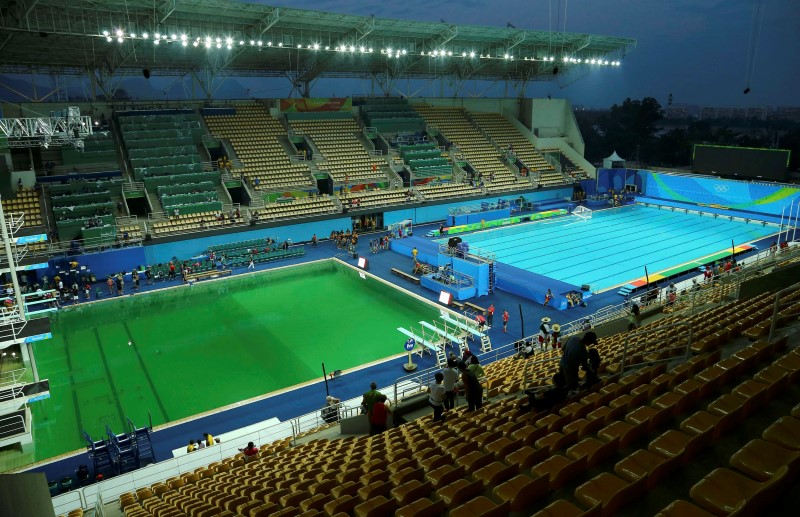By Daniel Flynn
RIO DE JANEIRO (Reuters) - Olympics organisers battled an array of persistent problems as the Games entered its second week on Saturday, from a lurid green diving pool to competitors taken to the wrong venue and a long-distance swimming pontoon swept away by the waves.
The refusal of the Olympic diving pool to return to a more appealing blue hue has baffled technicians and competitors alike after it was pumped full of chemicals since turning a cloudy green colour on Tuesday.
World swimming governing body FINA blamed the colour change on a failure by the organisers to sufficiently treat the water after tanks at the venue ran out of pool chemicals.
The organisers added more chlorine, which kills algae and helps to keep water blue, in the hope of repeating some success they had had with the adjacent waterpolo pool, which had also turned green. The diving pool, though, did not respond while waterpolo players complained of stinging eyes.
Rio 2016 spokesman Mario Andrada said organisers were stepping up their efforts on Saturday. There remains a week of competition in diving events, which wrap up on the final Saturday of the Games.
"We are moving to a more radical approach with the water. Part of the water in the main pool will be replaced later in the evening," Andrada, who had originally said the problem would be fixed on Wednesday, told a news conference.
He also said a group of swimmers had risked missing their races after a bus driver meant to have taken them to the Olympic pool misheard the acronym used for the site and drove them instead to the athletics stadium on the other side of town.
FINA made changes to the schedule so the swimmers could return to the site in time to warm up and compete and Andrada said bus drivers had been instructed to use the full name of the site as well as the acronym to avoid further confusion.
Organisers' decision to spread the Games across a number of sites around Rio de Janeiro - one of Brazil's largest cities with more than 12 million people in the wider metropolitan area - has been criticised by some competitors and fans for the long distances and hours spent in traffic.
"We cannot confine the Olympic spirit and the transformation that the Olympics bring to a city to a single area and when we prepared the Games we decided to spread ... the benefits around the city," Andrada said.
"We need to make sure the transportation works. We need to make sure people can access the Olympic stadium in a quick and easy manner," he said.
He added that there was an "unprecedented" last-minute change to the schedule of the women's swimming competition on Friday, made in consultation with FINA, broadcasters and technical experts. But he did not give a reason, and it was unclear if this was connected to the transport mix-up.
Organisers said they had a standby pontoon for the 10-km marathon swimming off Copacabana beach after the original pontoon was swept away. The men's and women's races are due to take place on Monday and Tuesday.

"We have a second platform to replace the first one and if the second platform has the same problem then we will use another system, that is being prepared now," Andrada said.